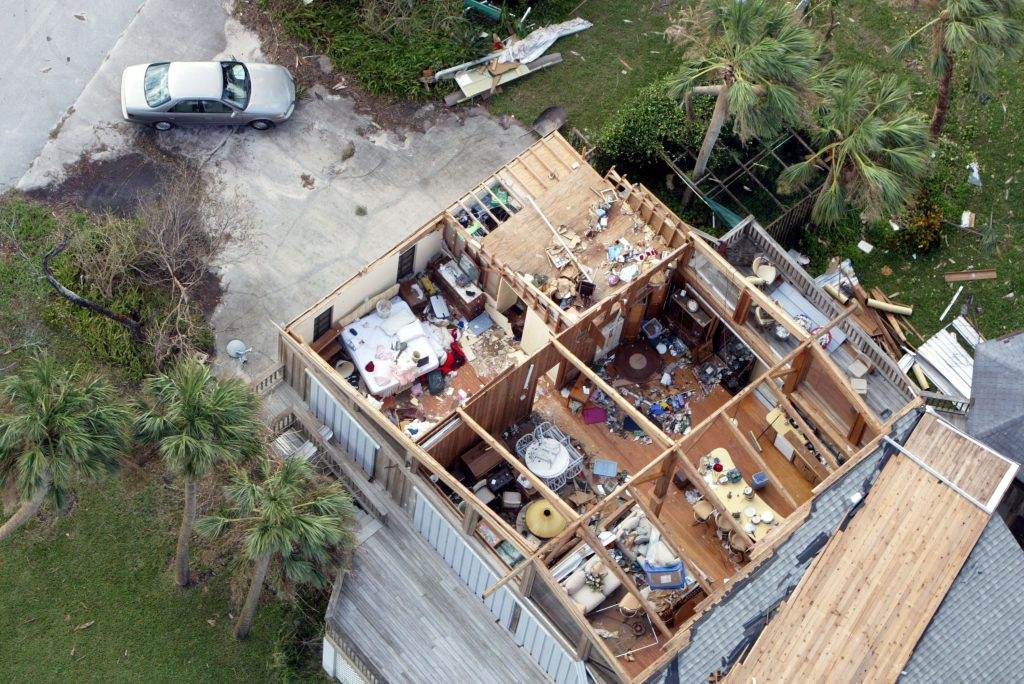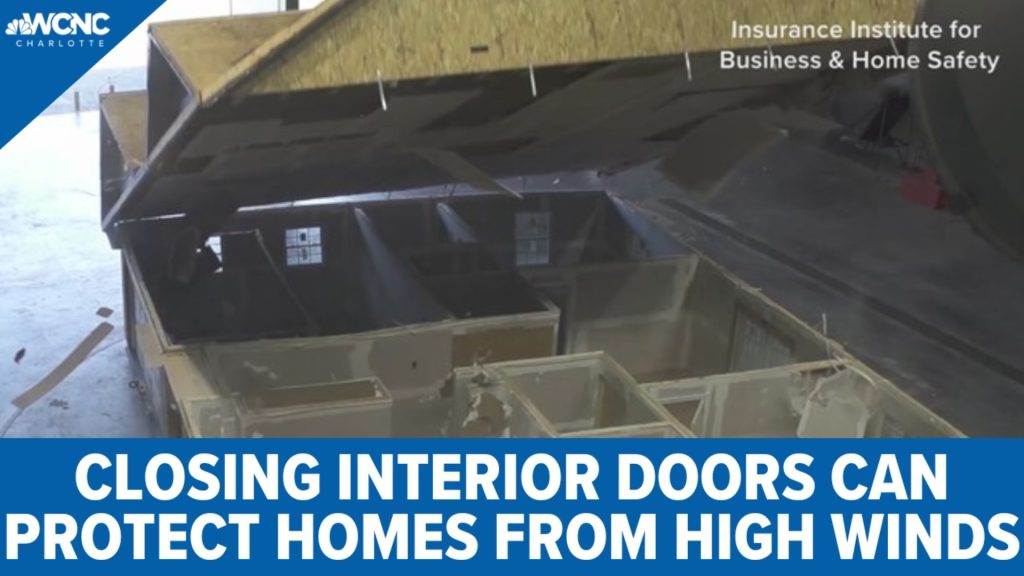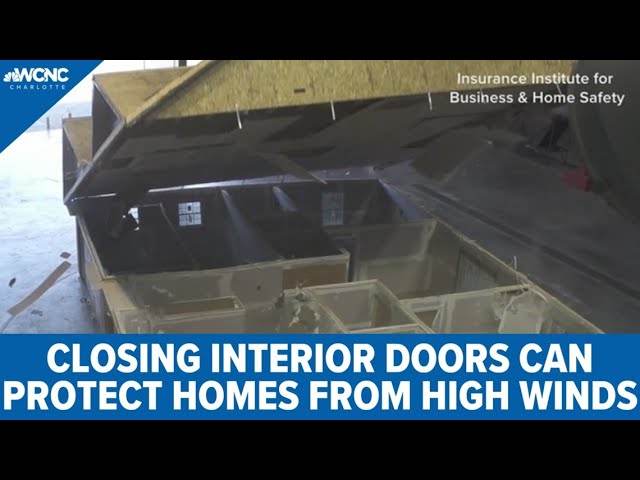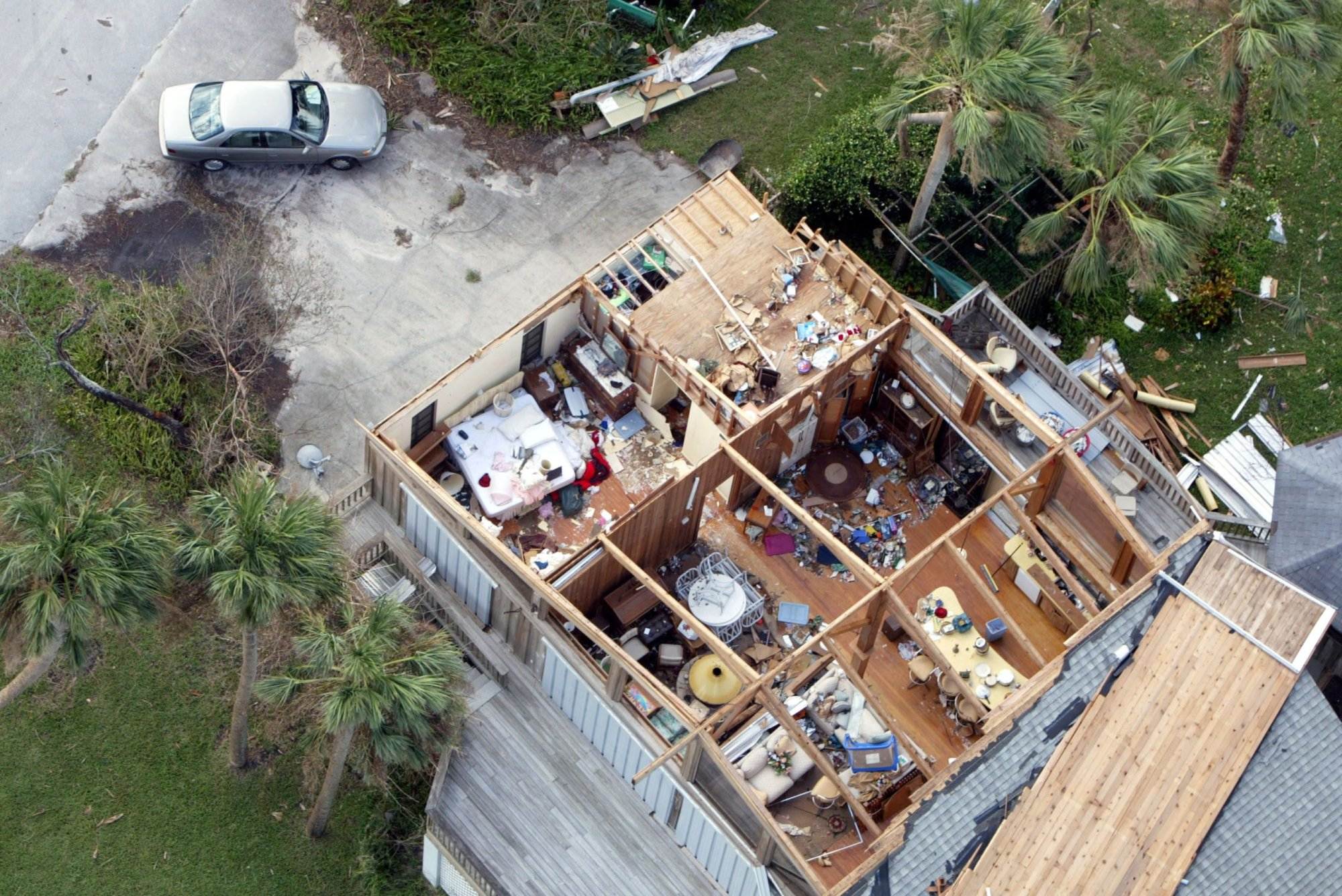During a hurricane, the question of whether or not to close interior doors can be a point of confusion for many homeowners. While some may argue that closing doors can help to prevent wind pressure from building up inside the house, others believe that keeping them open allows for better airflow and reduces the risk of structural damage. In this article, we explore this common dilemma and provide insights into the potential benefits and drawbacks of both options, so you can make an informed decision when the next hurricane strikes.

This image is property of mma.prnewswire.com.
Importance of Interior Doors During a Hurricane
When it comes to preparing for a hurricane, many homeowners focus on securing their windows, reinforcing their roofs, and stocking up on supplies. However, one often overlooked aspect is the importance of interior doors. These seemingly ordinary features of our homes play a crucial role in protecting us and our property during a hurricane. Let’s explore the reasons why interior doors are important and the factors to consider when deciding whether to close them or not.
Preventing Damage and Debris
One of the primary functions of interior doors during a hurricane is to prevent damage and debris from spreading throughout the house. By closing all interior doors, we create barriers that can help contain the impact of high winds and flying debris. This can be particularly beneficial in minimizing damage to valuable items, appliances, and furniture, as well as reducing the risk of injury caused by flying objects.
Preserving the Structure of the House
Another significant reason to close interior doors during a hurricane is to preserve the overall structure of the house. When strong winds and storm surges hit a home, they create substantial pressure imbalances. By closing interior doors, we can minimize the pressure difference between rooms and help maintain the integrity of the building. This can be especially important for older homes or houses with weak structural components.
Protecting Against Water Intrusion
Water intrusion is a common and destructive issue during hurricanes. Heavy rain, storm surges, and flooding can easily find their way into our homes, causing extensive damage to our belongings and the structure of the house. By closing interior doors, we can create additional barriers to limit the infiltration of water into different areas of our homes. While it may not completely prevent water damage, it can significantly reduce its extent and help salvage valuable items.
Factors to Consider
Determining whether to close interior doors during a hurricane depends on several factors. It’s crucial to assess these factors before making a decision, as they can greatly impact the effectiveness and safety of this strategy.
Hurricane Category
The first factor to consider is the category of the hurricane. The strength and intensity of the hurricane will dictate the level of danger and potential damage. Higher category hurricanes, such as Category 3 or 4 storms, pose a significantly greater threat and usually require more stringent protective measures, including closing interior doors.
Strength of Interior Doors
The strength and durability of interior doors also play a vital role in their effectiveness during a hurricane. Solid core or solid wood doors provide better resistance to wind pressure and flying debris compared to hollow core doors. If your interior doors are made of weaker materials, such as particleboard or fiberglass, it might be necessary to reinforce them or consider alternative protection methods.
House Location
The location of your house is another crucial factor. Homes situated in coastal areas or regions prone to high winds are more susceptible to hurricane damage. These houses will benefit from closing interior doors to mitigate the impact of wind and debris. Additionally, houses in low-lying or flood-prone areas should take extra precautions to prevent water intrusion by closing interior doors.
Previous Damage
If your house has experienced previous damage from a hurricane or other severe weather events, it’s essential to consider the impact of closing interior doors. Damaged doors or compromised door frames may not provide sufficient protection, and alternative strategies, such as boarding up or using hurricane shutters, might be necessary.

This image is property of hips.hearstapps.com.
Closing Interior Doors: Pros
Closing interior doors during a hurricane offers several advantages that can help protect our homes and ensure our safety.
Minimizing Wind Pressure
When high winds batter against our homes, they create considerable pressure imbalances, which can lead to roof uplift and structural failure. Closing interior doors can help reduce the pressure differential by creating barriers within the house. This aids in maintaining the stability and integrity of the structure, reducing the risk of devastating damage.
Reduced Air Infiltration
Closing interior doors can also help minimize air infiltration during a hurricane. Drafts and air leaks can compromise the insulation of our homes, leading to increased energy consumption and discomfort. By sealing off different areas with closed doors, we can retain a more stable indoor environment and reduce air infiltration.
Segregation of Damaged Areas
In the unfortunate event of damage occurring during a hurricane, closing interior doors can help isolate the affected areas. By sealing off damaged rooms or sections of the house, we can prevent the spread of water, debris, and potential hazards to other parts of the home. This segregation can make the post-hurricane cleanup and restoration process more manageable and efficient.
Limited Water Intrusion
Water damage is one of the most challenging issues to deal with after a hurricane. Closing interior doors can serve as an additional barrier against water intrusion, limiting its spread to specific areas. While it might not completely prevent water infiltration, it can significantly reduce the amount of damage and give homeowners a better chance of salvaging their belongings.
Closing Interior Doors: Cons
While there are clearly advantages to closing interior doors during a hurricane, it’s important to consider the potential drawbacks and risks associated with this strategy.
Potential Lock-In Situations
One significant concern when closing interior doors is the risk of lock-in situations. If interior doors are the only access points to certain areas of the house, closing them may prevent escape during an emergency. It’s crucial to ensure that there are alternative exit routes available to prevent being trapped inside the house during or after a hurricane.
Imprisoning Hazardous Gas
In some cases, closing interior doors during a hurricane can inadvertently trap hazardous gases within the house. For instance, a gas leak or carbon monoxide emission could occur during the storm, and closed interior doors could hinder the dispersal of these dangerous substances. It’s essential to have adequate ventilation and regularly maintain gas-powered appliances to minimize this risk.
Decreased Visibility
Closing interior doors limits visibility within the house, making it challenging to assess the situation and locate potential hazards during a hurricane. This reduced visibility can impede evacuation efforts and hinder emergency responses. Supplementing closed interior doors with proper lighting and keeping a flashlight or headlamp readily available can help mitigate this issue.
Limited Escape Routes
Closing interior doors may restrict movement within the house and limit escape routes in the event of an emergency. It’s crucial to have clear evacuation plans and ensure that all household members know alternative exit routes beyond the closed doors. This preparation can save valuable time and potentially lives during a hurricane or other emergencies.

This image is property of i.ytimg.com.
Alternative Strategies for Door Protection
If closing interior doors poses too many risks or is not feasible, there are alternative strategies that can be employed to protect your doors and your home during a hurricane.
Reinforcing Interior Doors
If your interior doors are not highly durable, you can reinforce them to improve their resistance to wind pressure and flying debris. Reinforcements can include adding metal braces or hurricane-resistant glass panels. Consulting a professional contractor can help determine the most effective method for your specific interior doors.
Boarding Up Doors
Boarding up doors with plywood or hurricane shutters is another effective way to protect your home during a hurricane. By covering the doors with these materials, you create a solid barrier against wind, debris, and potential water intrusion. Ensure that the boards or shutters are securely fastened to provide optimal protection.
Using Hurricane Shutters
If your house is equipped with hurricane shutters, they can offer enhanced protection for your doors. Closing the shutters provides an additional layer of defense against wind, flying debris, and water intrusion. Make sure your shutters are fully functional and regularly maintained to ensure their effectiveness.
Evacuating the Premises
In certain situations, the best course of action might be to evacuate the premises altogether. If you live in an area prone to severe hurricanes or face significant risks due to location or other factors, following evacuation orders can be the safest option. Ensure you have a well-prepared emergency evacuation plan and know the designated evacuation routes in your area.
Additional Measures for Preparedness
Beyond the decision of whether to close interior doors, there are several additional measures homeowners should take to ensure their safety and the protection of their property during a hurricane.
Creating an Emergency Kit
having an emergency kit ready with essential supplies is crucial in any disaster situation. This kit should include items such as non-perishable food, drinking water, flashlights, batteries, first aid supplies, medications, important documents, and emergency contact information. Prepare the kit well in advance of any hurricane warnings to ensure you have everything you need.
Securing Valuables
To protect your valuable possessions, consider moving them to higher floors or elevating them above potential flood levels. Ensure that important documents, family heirlooms, and sentimental items are stored in water-resistant containers or sealed plastic bags. Taking these precautions can help minimize the potential loss or damage to your prized belongings.
Boarding Up Windows
In addition to protecting doors, securing windows is crucial during a hurricane. You can use plywood or proper hurricane shutters to board up windows and prevent them from shattering due to high winds or flying debris. Reinforcing windows provides added protection to your home and reduces the risk of damage from the elements.
Electronic Device Backup
In the event of a power outage, it’s essential to have backup power sources for your electronic devices. Portable chargers, battery-operated radios, and solar-powered chargers can help you stay connected, receive emergency updates, and communicate with loved ones during the storm. Keep these devices fully charged and readily available before the hurricane strikes.

This image is property of media.wcnc.com.
Recommendations for Different Scenarios
The appropriate course of action regarding interior doors during a hurricane can vary depending on specific scenarios and circumstances. Here are some recommendations based on different factors:
Category 1 or 2 Hurricane
For lower category hurricanes, such as Category 1 or 2 storms, closing interior doors can provide sufficient protection against wind pressure and minor debris. However, it’s important to monitor the situation closely and consider alternative strategies if the storm strengthens.
Category 3 or 4 Hurricane
For stronger hurricanes, such as Category 3 or 4 storms, closing interior doors alone may not be enough to ensure adequate protection. Boarding up doors, reinforcing them, or utilizing hurricane shutters are recommended in addition to closing interior doors. Evacuation should also be seriously considered in these cases.
Areas Prone to Flooding
In areas prone to flooding, closing interior doors can help limit water intrusion and prevent it from spreading throughout the house. It’s crucial to reinforce doors, seal any gaps or cracks, and elevate valuable items to higher levels. Considering additional flood protection measures, such as sandbags or flood barriers, can further safeguard your home.
Older or Damaged Doors
If your interior doors are older or have previously sustained damage, closing them alone may not provide sufficient protection during a hurricane. Consider reinforcing or replacing weak doors with more durable alternatives. Boarding up or utilizing hurricane shutters can also provide better protection in these situations.
No Evacuation Plans
If you don’t have a viable evacuation plan or your location poses significant risks, closing interior doors becomes even more crucial. Supplement this with other protective measures for doors and windows, such as boarding up, reinforcing, or using hurricane shutters. Be prepared for potential power outages and follow recommendations for emergency preparedness.
Expert Opinions
When making decisions regarding interior door closure during a hurricane, it’s valuable to consider the insights and recommendations of experts. Here are some notable organizations and their viewpoints:
National Hurricane Center
The National Hurricane Center (NHC) advises homeowners to close all interior doors during a hurricane to reduce pressure differences and potential damage to the structure. They recommend securing windows and exterior doors as well, along with evacuating high-risk areas as necessary.
Federal Emergency Management Agency (FEMA)
FEMA also recommends closing interior doors during a hurricane to prevent pressure imbalances and limit the spread of damage. They emphasize the importance of reinforcing weak doors and using alternative protection measures for windows and exterior doors, if necessary.
American Red Cross
The American Red Cross advises homeowners to close all interior doors during a hurricane to limit wind pressure and potential debris impact. They highlight the importance of evacuation planning and ensuring clear escape routes, while also urging the reinforcement of doors and protection of windows.

This image is property of i.ytimg.com.
Conclusion
When it comes to closing interior doors during a hurricane, the decision should be based on a careful evaluation of various factors, including the hurricane category, strength of doors, house location, and previous damage. While closing interior doors offers advantages such as minimizing wind pressure, reducing air infiltration, segregating damaged areas, and limiting water intrusion, there are potential risks and drawbacks to consider, such as lock-in situations, imprisonment of hazardous gas, decreased visibility, and limited escape routes.
Alternative strategies, such as reinforcing doors, boarding up, using hurricane shutters, or evacuating, can be suitable options depending on individual circumstances. It is crucial to take additional measures for preparedness, including creating an emergency kit, securing valuables, boarding up windows, and having backup power sources for electronic devices.
The recommendations for different scenarios emphasize the need for tailored approaches based on the hurricane category, flood-prone areas, door conditions, evacuation plans, and expert opinions. By carefully evaluating the risks and benefits and considering expert recommendations, homeowners can make informed decisions to protect themselves, their families, and their homes during a hurricane.
Additional Resources
For further information and guidance on hurricane preparedness, consider consulting the following official resources:
- National Hurricane Center (NHC)
- Federal Emergency Management Agency (FEMA)
- American Red Cross
Additionally, local emergency management offices and community outreach programs in your area can provide valuable insights and assistance in preparation for hurricanes and other emergencies.
